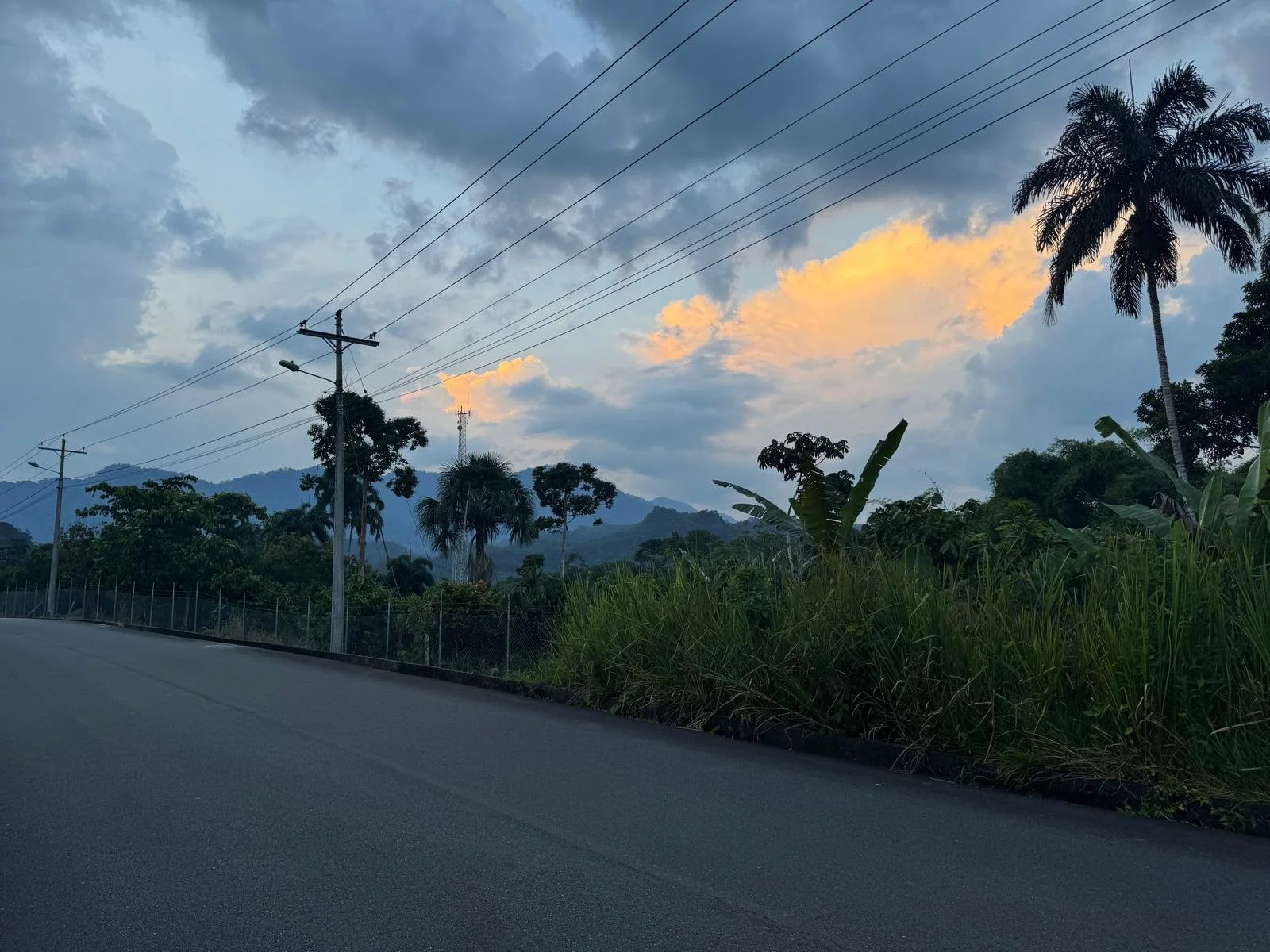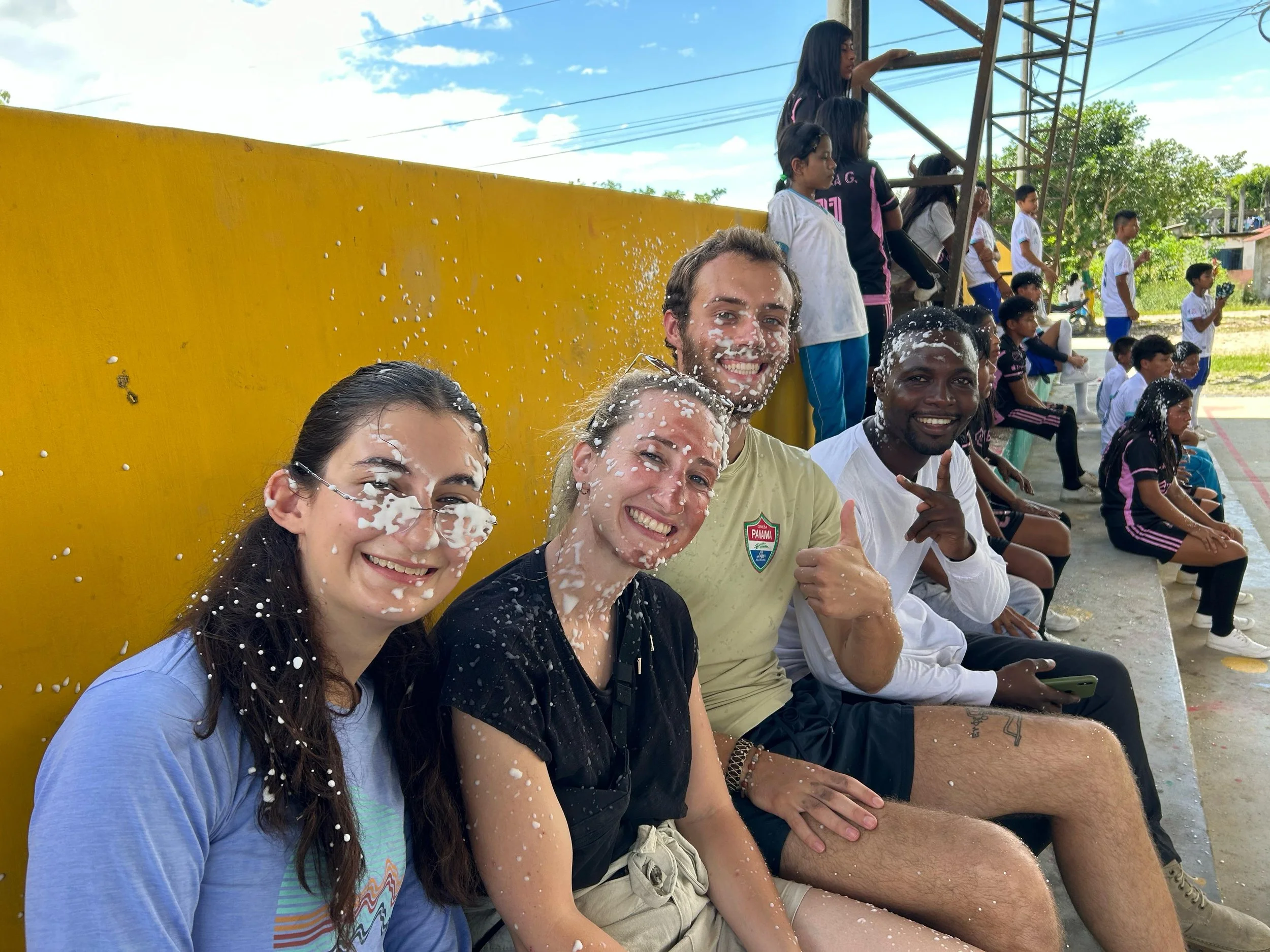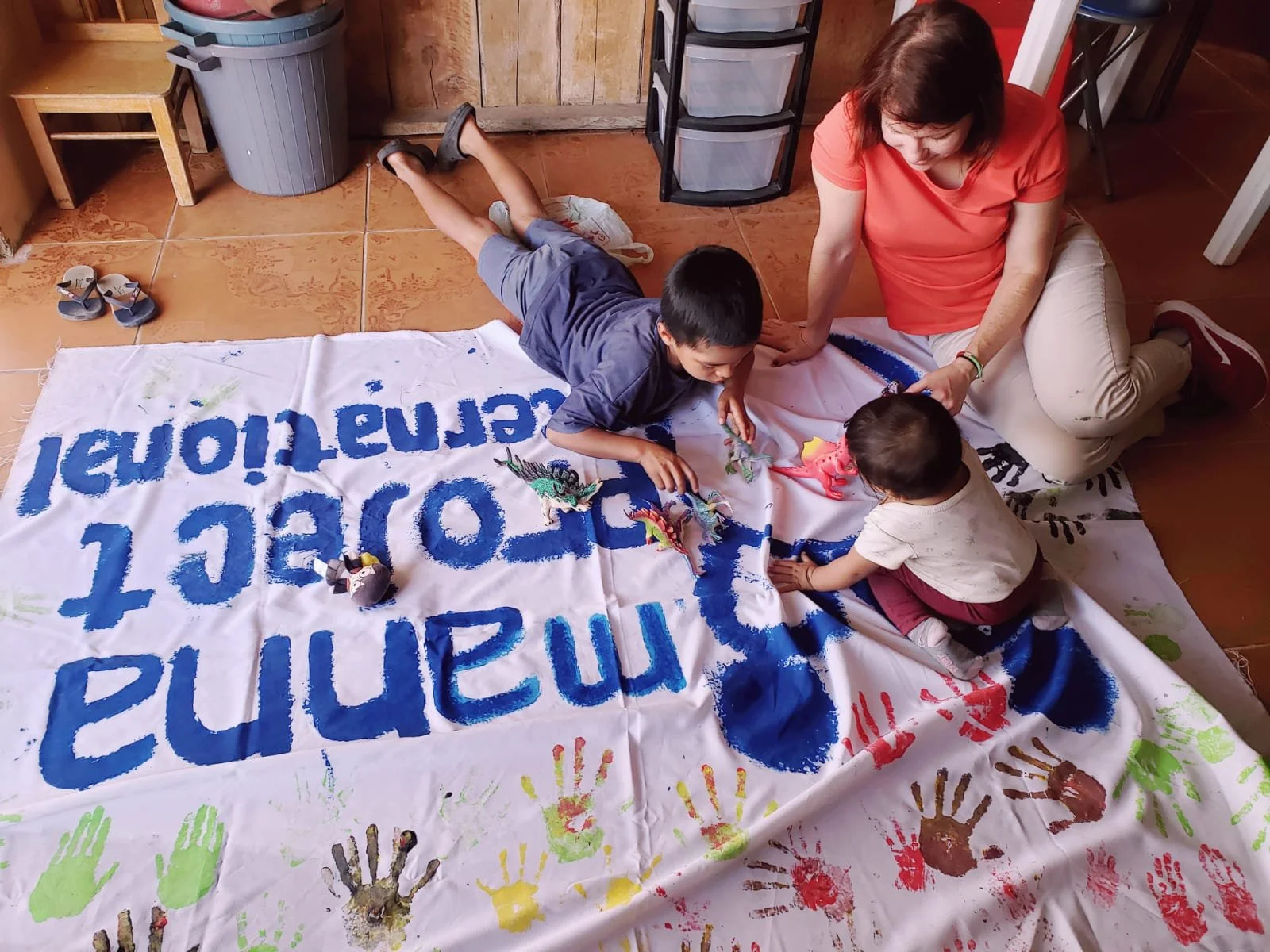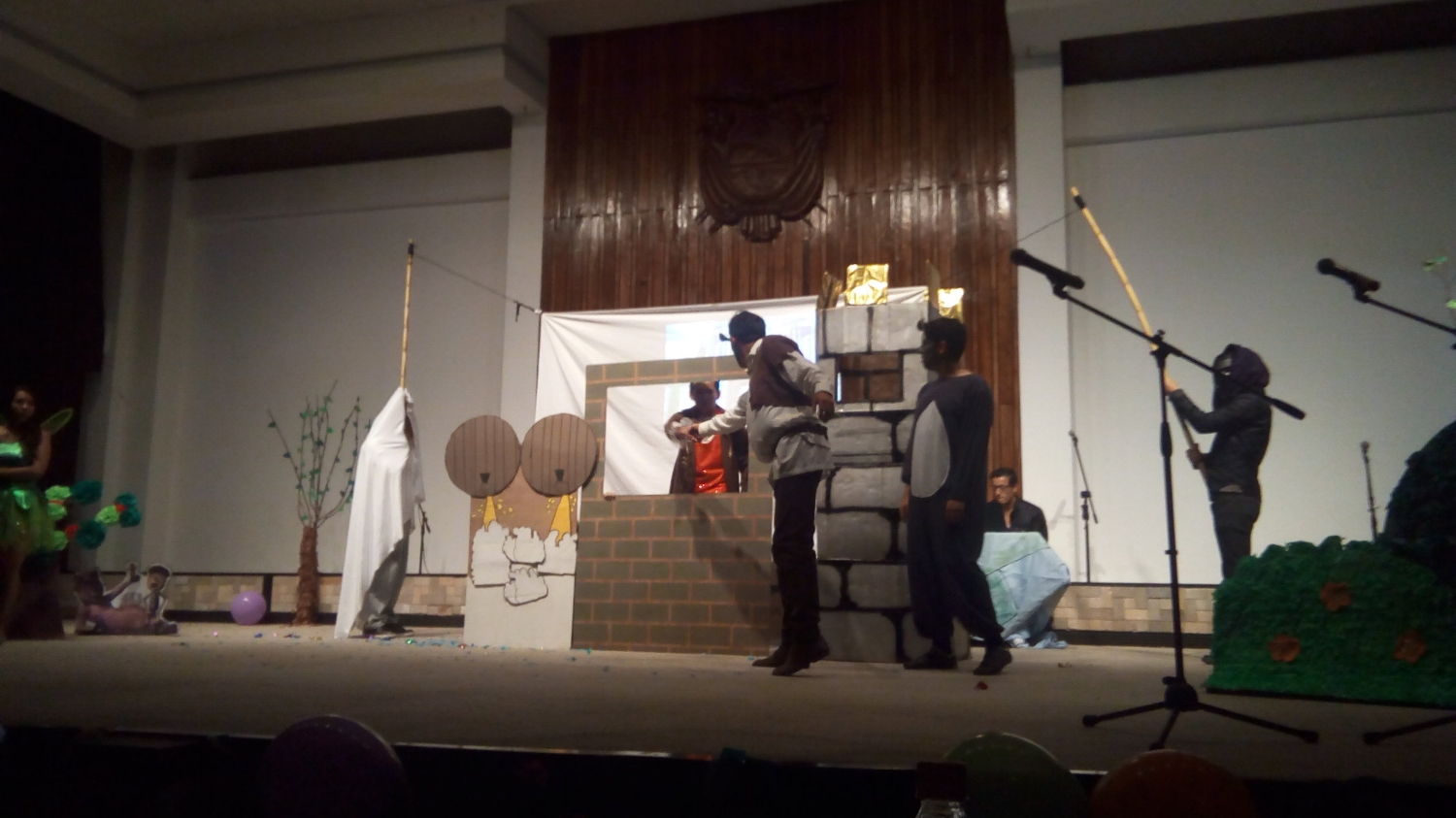I feared my lack of Spanish would hold me back during the externship—but instead, it pushed me to connect in new ways. Simple phrases, shared work, and warm community invitations made me feel less like an outsider and more like a part of something bigger.
Making a Home in Shandia
Making a Home in Shandia: A Program Director’s Homestay with Berta
By: Patrick Maluwa, Program Director ‘24-’25
When volunteering abroad or interning abroad, communication is so important to understanding the host culture. Manna Project International's long term volunteer from Malawi shares a bit about his time spent in a homestay in a Kichwa family in the Amazon Rainforest and how it improved Spanish, Kichwa, and his understanding of the community he was in.
When I was leaving my home to come to Ecuador, I was feeling very sad as I was thinking about leaving my family, friends, and my country for the first time in my life. This was hard to swallow for me. The day came when my family and friends gathered to escort me to the airport. Seeing my mother cry as I checked into my flight hit me very hard as the knowledge that I would be away from home for a long period of time finally landed. She hugged me and whispered in my ear, "I am happy for you, my son. Seeing you grow and have the passion to serve communities and be one of the responsible members of society is one thing that I desired for you and now I am witnessing your growth, however I will miss you and please work hard". The journey began. It was a very long trip full of unanswered questions as it was my first time to go to Ecuador and leave Malawi, so I didn't know about the way of life of the people, or even the place, weather, or the food.
Fast forward 6 months to now and the way people have welcomed me in this community and made me feel comfortable and feel like I'm home. Despite being welcomed in the community I had one barrier which was communication as I had zero knowledge about Spanish speaking and most of the people in this community not only speak Spanish, but they also speak Kichwa language which is an indigenous language in South America, part of the Quechua family. Because of this, I was having problems communicating. Therefore Manna Project International helped me organize a homestay as a way to practice more Spanish and learn more about the community’s culture. I now write to share my experience of my home stay and the second home that I’ve built in Shandia.
I spent my 2 weeks living with my mother, Berta Andi. Berta Andi is a Shandian woman whom I came to know through the programs that we have here at Manna Project International, especially through the agriculture project. We have gotten close through this program as I get to go with her to her chakra and help her there. Berta is 56 years old and she lives alone with her dog, Blanca. She has a son who is a student in the University of Ambatta and is unable to visit frequently because of the workload and the 6 hour bus journey. During my homestay I learnt a lot from her and experienced motherly love from her. She taught me how to prepare local food such as maito de tilapia,a local tea called guayusa, chicha de yuca, and jugo de naranja (orange juice). She always made sure that I slept well and that I was under the mosquito net. She is so caring and acted like a mother to me. Some days we would make dinner together and chat as a way to teach me a lot of words in Kichwa and Spanish as well as what she learnt from her parents as a child, such as cooking, working hard, being strong and fishing.
It was really a life changing period for me as she was teaching me things that can be helpful for me to have a better understanding of the Shandia community and Kichwa culture. She introduced me to many of her relatives such as her brothers and nephews and nieces. One of her nephews is named Limber and he also became a good brother of mine. I am so grateful for making this connection. Limber taught me how to fish as we used to go fishing together and catch different fish like kala chasma.In addition to the cooking I learnt from Berta, Limber also taught me how to prepare a local dish meal by the name chontaduro.
Judging an English Theatre Competition in Ecuador
Have you ever wanted to be Simon Cowell from American Idol? Or maybe you lean more Adam Levine from The Voice? Well fans, you’re in luck. I’m about to share with you the inner details of how it feels to be a judge in a real-life competition. How did I end up so lucky and famous you might ask? I speak English. That’s how.
Here in Ecuador, we work with a University called the Universidad de las Fuerzas Armadas, or ESPE for short. Each week, as Program Directors we assist in English classes, giving advice on pronunciation and how to study English. This relationship has been active for years and it is a fun way for Program Directors to make friends in the community that are of a similar age range. That being said, ESPE often asks us to help them with extracurricular activities, one of which recently was a theatre competition.
Each English class from the three ESPE campuses across Ecuador worked for weeks on preparing a play to be presented at a country-wide competition. These plays were of childhood fairy-tales or stories, adapted in English. This activity helped students learn how to think creatively in another language, while also encouraging fun participation! After weeks of practicing, came the final competition! Seeing as though the volunteers at Manna are native English speakers, we were asked to participate as judges for the final competition. Due to scheduling conflicts, I was the only one able to attend- and boy was it an experience!
I arrived on site and was greeted by the guards of the military base where it was being held. I was brought to the theatre, and escorted to the front row where I saw with the panel of two other judges- an English teacher from Quito and native Canadian, and an Ecuadorian actor. We were given padfolios with voting ballots and introduced formally to what we would be doing. After being given a grading cheat sheet, we sat and waited…and waited…and waited… for the plays to start. After the slight delay due to technical difficulties, the first play began. It was the tale of Beauty and the Beast, a fan favorite and household classic. The beast costume was phenomenal, and Belle (also known as simply Beauty in this rendition) truly let her voice be heard. Although this tale was certainly as old as time, there was no Emma Watson and therefore, was a slight letdown. Despite this, as judges we could clearly see how much work had been put into the execution of these plays. The backdrops, musical effects, and memorized lines (in English) were impressive and kept our attention!
As the night continued, I felt the pressure starting to mount- choosing first, second, and third places was not just a game! As a matter of fact, these kids really really cared about winning! With various intermissions from Professors singing their favorite karaoke jams (one even belted Whitney Houston’s “I Will Always Love You”), the battle of the plays continued.
While my favorite, a tale entitled “The White Falcon” took home the prize, I’d love to give honorable mention to “Scooby Doo and the Gang” who not only one-upped my incredible (not so humbly bragging) Daphne costume, but also used a REAL DOG to be Scooby doo! What a night it was!
In conclusion, in a few short hours my childhood dream of playing Paula Abdul as a judge for American Idol came to fruition. I was able to support an incredibly important community group we work with, while also experiencing all of my favorite childhood stories- just slightly modified-and in broken English. Nonetheless, it was an experience I will remember forever, and the free ESPE Padfolio I was gifted helps!
If you want to have the opportunity to get involved with community partners, apply to be a Program Director today!
Lost In Translation
Mishaps in Communication
No trip to a foreign country is complete without its fair share of language blunders and miscommunications. If you’re an MPI Program Director living in Ecuador for an extended period of time, there is even more time to adequately embarrass yourself. Although we have all taken Spanish classes in school, the Spanish language has still managed to confuse, tongue-twist and humiliate us in ways we just had to share.
We have swallowed our pride to form this list of false cognates (Spanish words that sound/look like English words but have different meanings) that we have either used ourselves or felt the need to warn other English speakers about. The list is organized in categories of increasing embarrassment, so if you’re going to pay attention to any particular section, it should probably be the last one!
Food Faux Pas:
· Atún: This means tuna. Don’t forget it.
· Aceituna: This means olives. No clue who made that decision!
· Sano: This means healthy. So don’t get worried when it sounds like people are talking about the mental health of vegetables (sane).
· Limón: Lime. Lemons don’t really exist in Ecuador, which I guess makes this a bit easier. However, I have heard a lemon referred to as a lima before, which makes my head spin.
· Sopa: This means soup. Soap is jabón. This will prevent you from asking your hotel for Campbell’s to clean yourself off in the shower.
You’ve Just Gotta Laugh at These:
· Bombero: Fireman. The good guys. Don’t panic when you hear this word. Okay, maybe you should panic a little…and probably evacuate your house… but for fire reasons, not for explosives.
· Codo: Elbow. You’ll never get the Wi-Fi code if you use this word to ask for it.
· Bizarro: Brave or valiant.
· Bizarre: Strange or weird. Get these straight when trying to explain to your friends about a cute guy you recently met.
· Constipado: Congested. Relax - the people around you aren’t trying to open up to you about their personal digestive issues; they just have colds.
· Carpeta: Folder. Usually only a problem if you are a teacher, an employee in a paper store or a person trying to redecorate your home.
· Vaso: Glass. You’ll be disappointed at the size of the vase they give you for your flowers if this is what you ask for.
· Librería: Bookstore. (Library is biblioteca). Usually only problematic if you had been expecting to check out a book for free and get to the counter and are asked to pay.
· Soportar: To tolerate. If someone says this about their opinions of your ideas, just know that it doesn’t mean they’re passionately jumping on the bandwagon.
Now That’s Just Cruel:
· Billón: A trillion.
· Mil: A thousand. Don’t even get me started about these.
· Colegio: High School.
· Bachillerato: High School Diploma. Yup, I’m sure there are many people in this country who think I am less educated than I actually am.
· Estrechar: To reduce; narrow.
· Estirar: To stretch. Told ya these were cruel.
These May Cause Some Problems:
· Condescender: To consent to; to comply. You should probably start taking notes now.
· Delito: Crime. Not as delightful as we’d expected.
· Fabrica: Factory. If you go into a store asking for some of this, you may get way more than you had asked for…
· Éxito: Success. In case of an emergency, although yes, you’d probably want success, I think what you’re really looking for is the salida.
· Caliente: Hot… as in attractive. If it’s a hot day, say tengo calor. You’ll sound way more humble.
· Discusión: Argument. I may suggest making flash cards at this point.
· Grosería: Vulgarity; bad word. Don’t ask for this. It won’t make you many friends. Ask instead for la tienda or el mercado.
You REALLY Don’t Want to Mess These Up:
· Introducir: To insert. If you want to introduce your male friend to a girl, use presentar. This will keep you from getting slapped.
· Embarazada: Pregnant. You’ll be way more embarrassed if you mess this up than you were at whatever caused you to use the false cognate in the first place.
· Molestar: To annoy; to bother. Don’t call the police if you hear two young kids using this word. He probably just pulled her hair or took her toy.
· Nudo: Knot. Imagine the possibilities of messing this one up…
· Excitado: Sexually aroused. If you’re just excited to see your friends or family or to start your new job, use emocionado. This will save you a lot of strange looks.
We hope you have enjoyed reading some of our most embarrassing misuses of language here in Ecuador...you may want to study up if you plan to visit!









